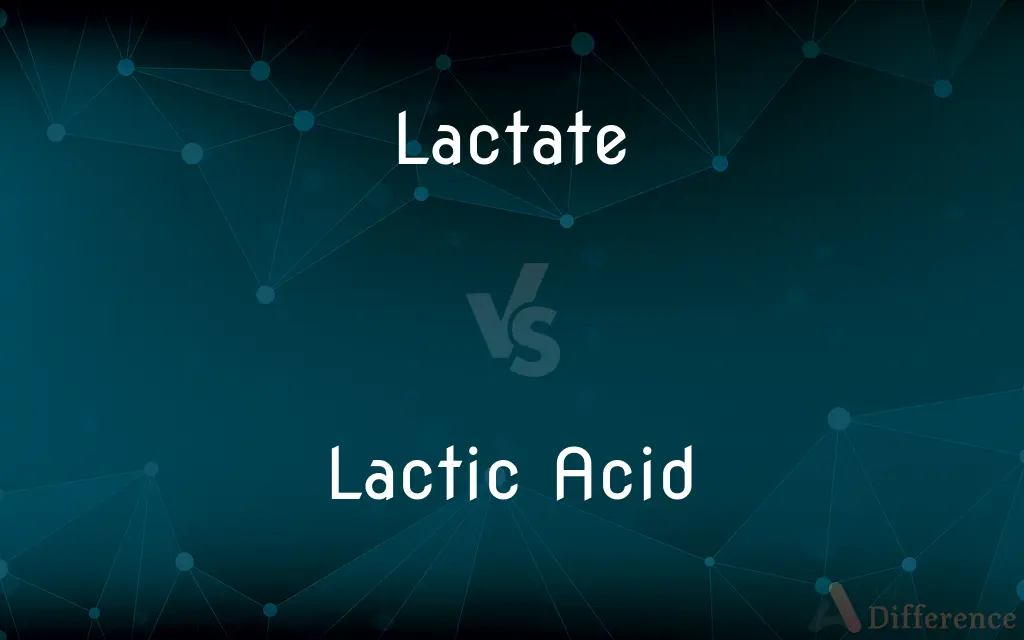Lactate vs. Lactic Acid — What's the Difference?
By Tayyaba Rehman — Published on November 7, 2023
Lactate is the ionized form of lactic acid, occurring when lactic acid donates a proton, with the former often found in metabolism and the latter known for its sour taste.

Difference Between Lactate and Lactic Acid
Table of Contents
ADVERTISEMENT
Key Differences
Lactate and lactic acid, though related, represent distinct entities in biochemistry and nutrition. Lactate, a component often discussed in the context of metabolic processes, especially during anaerobic respiration in muscles, forms when lactic acid loses a proton. On the contrary, lactic acid, notable for its presence in sour dairy products and fermented foods, is an organic acid that can donate a proton and become lactate under certain physiological and environmental conditions.
Lactate plays a pivotal role in metabolic processes, becoming particularly prominent during exercise or any physical activity that demands energy production in the absence of sufficient oxygen, activating anaerobic pathways. In contrast, lactic acid has been historically appreciated for its role in fermentation and food science, contributing to the sour taste and preservative properties in certain foods like yogurt and pickles, embodying a culinary aspect in its character.
In physiological scenarios, lactate can be utilized as an energy source, especially in muscles, the heart, and the brain, and serves as a transporter of energy between organs, facilitating crucial biological functions. Whereas lactic acid, while also participating in metabolic pathways, often arises in conversations about acidosis, a condition where excessive acid accumulation in the body can alter physiological pH, disrupting normal cellular activities and can be harmful if unchecked.
Lactate, contrary to some misconceptions, is not responsible for muscle soreness experienced post-exercise but is an essential intermediary in metabolic pathways, facilitating energy production, especially during strenuous physical activities. Lactic acid, in its role within biological contexts, can influence the pH of cells and bodily fluids, potentially having deleterious effects if accumulated, requiring the body to implement buffering systems to maintain pH stability.
In summation, lactate serves predominantly as a metabolic intermediary, supporting energy production and inter-organ energy transfer under anaerobic conditions, without directly influencing cellular pH. Alternatively, lactic acid contributes not only to metabolic pathways but also to food science and potential alterations in physiological pH, establishing itself as a multifaceted molecule with implications in health, cuisine, and exercise physiology.
ADVERTISEMENT
Comparison Chart
Protonation State
Ionized, having accepted a proton
Can donate a proton
Role in Metabolism
Prominent, especially in anaerobic respiration
Present but often discussed as lactate
Culinary Significance
Limited
Notable in fermented foods
PH Influence
Does not directly alter pH
Can influence pH due to its acidic proton
Association
Often associated with exercise metabolism
Associated with sour taste and fermentation
Compare with Definitions
Lactate
Ionized Molecule
Lactate forms when lactic acid loses a proton.
Lactic Acid
PH Influencer
In high concentrations, lactic acid can lower bodily pH.
Lactate
Exercise Byproduct
During intense exercise, muscles produce lactate.
Lactic Acid
Organic Acid
Lactic acid can be found in sour milk.
Lactate
Metabolic Component
Lactate is produced during anaerobic respiration in muscles.
Lactic Acid
Proton Donor
When donating a proton, lactic acid becomes lactate.
Lactate
Energy Transporter
Lactate facilitates energy transfer between different organs.
Lactic Acid
Fermentation Agent
Lactic acid is crucial in the fermentation of various foods.
Lactate
Not Acidic
Lactate, being ionized, does not directly influence cellular pH.
Lactic Acid
Metabolic Participant
Lactic acid can be involved in metabolic processes, particularly through its ionized form, lactate.
Lactate
To secrete or produce milk.
Lactate
A salt or ester of lactic acid.
Lactate
(intransitive) To secrete or produce milk
Lactate
(chemistry) Any salt or ester of lactic acid
Lactate
Ellipsis of lactate ion
Lactate
A salt of lactic acid.
Common Curiosities
Is lactate acidic?
No, lactate itself is not acidic as it is the ionized form of lactic acid.
Is lactate responsible for muscle soreness?
No, lactate is not directly responsible for muscle soreness post-exercise.
Where is lactic acid commonly found?
Lactic acid is often found in fermented foods like yogurt and sauerkraut.
Does lactic acid always convert to lactate in the body?
Lactic acid converts to lactate in the body when it donates a proton, often occurring in physiological contexts.
Is lactic acid harmful to the body?
Lactic acid is not harmful per se but excessive accumulation, leading to lactic acidosis, can be harmful.
What role does lactate play in exercise?
Lactate is involved in energy production during anaerobic exercise and can also be used as an energy source.
How is lactate formed from lactic acid?
Lactate is formed when lactic acid donates a proton.
Can lactic acid affect pH levels?
Yes, lactic acid can influence pH levels due to its ability to donate a proton.
Why is lactate important in metabolism?
Lactate plays a vital role in providing and transporting energy, especially during anaerobic metabolism.
Does the body utilize lactic acid for energy?
Lactic acid, in the form of lactate, can be utilized for energy in various tissues.
Are lactate and lactic acid interchangeable in biological contexts?
While related, lactate and lactic acid are distinct entities and not always interchangeable in biological discussions.
Can lactic acid be used in food preservation?
Yes, lactic acid is used in the preservation of certain foods due to its antimicrobial properties.
Does lactate facilitate energy transfer?
Yes, lactate can transport energy between organs and be converted back to energy.
Is lactic acid always present in the body?
Lactic acid can be present but is often in its ionized form, lactate, in physiological conditions.
How is lactate cleared from muscles?
Lactate can be cleared via the bloodstream and converted back into energy in various organs.
Share Your Discovery

Previous Comparison
Financial Crisis vs. Economic Crisis
Next Comparison
Primary Education vs. Secondary EducationAuthor Spotlight
Written by
Tayyaba RehmanTayyaba Rehman is a distinguished writer, currently serving as a primary contributor to askdifference.com. As a researcher in semantics and etymology, Tayyaba's passion for the complexity of languages and their distinctions has found a perfect home on the platform. Tayyaba delves into the intricacies of language, distinguishing between commonly confused words and phrases, thereby providing clarity for readers worldwide.












































